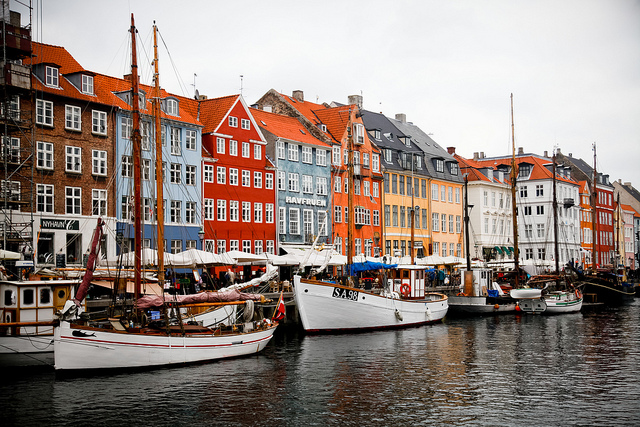Social Democracies Top Global Happiness Index Again; U.S. Falls Again
The wealthiest country in the world ranks just 37th for social support, 61st for freedom and 42nd in the report's measure of corruption. vic xia / Flickr
vic xia / Flickr
The social democracy of Finland was once again ranked number one on the United Nations’ World Happiness Report, released on Wednesday, while the corporate-dominated United States fell one place to rank at 19th.
For the seventh year in a row, the UN’s Sustainable Development Solutions Network released a report ranking 156 countries according to measures including income, freedom, trust in government, and social support.
1 Finland, 2 Denmark, 15 UK, 19 USA, 140 India & 156 South Sudan
World Happiness Report ranks 156 countries levels of happiness based on factors such as life expectancy, social support, corruption & by how happy their citizens perceive themselves to behttps://t.co/IZihHiT52e pic.twitter.com/h8qMHrV9xo
— Munish Datta (@MunishDatta) March 20, 2019
The United States fell one place from last year, ranking as only the 19th-happiest nation in the world despite being the wealthiest nation in the world.
Finland has less wealth than the U.S., but the UN’s report suggests that the country’s commitment to ensuring an equitable quality of life for all its residents has led to greater satisfaction among the population.
The top ten countries were largely Nordic nations with strong social welfare systems and an emphasis on equality.
Finland was followed by Denmark, Norway, Iceland, and the Netherlands, all of which were highly ranked last year as well. Among the top 20 countries, all but the U.S. has some form of universal healthcare for its citizens.
The study noted that some of the highest-ranking nations ensured that immigrants have a high quality of life as well as native residents.
“It’s true that last year all Finns were happier than rest of the countries’ residents, but their immigrants were also happiest immigrants in the world,” economist and report author John F. Helliwell told CNN. “It’s not about Finnish DNA. It’s the way life is lived in those countries.”
The U.S. ranked 37th for social support, 61st for freedom, and 42nd in the report’s measure of corruption.
A major conclusion of the discussion of the 2019 World Happiness Report at the @UN today is that the U.S. lags behind Scandinavian countries in happiness in large part because Americans are so divided, and see “others” as not as worthy of governmental support.
— Scott Barry Kaufman (@sbkaufman) March 20, 2019
Healthcare costs, high rates of addictions, socioeconomic inequality, and a poor emphasis on ensuring work-life balance were mentioned in the report as causes of unhappiness in countries around the world, including the U.S. The country’s low ranking in “freedom” may stem partially from the out-sized power held by corporations, with the government unwilling to protect its citizenry from large companies intent on boosting their profits.
“The United States doesn’t have a privacy law, though reference is made in the Constitution against the use of the government of information that violates privacy,” reads a chapter on big data and well-being. “Companies can do what governments cannot in the United States.”
The report comes three months after the Centers for Disease Control and Prevention revealed that life expectancy in the U.S. has dropped for the third year in row, with drug overdoses and suicides both major drivers of the trend.
“The U.S. has had, by now, two startling wake-up calls: back to back years of falling life expectancy and declining measured subjective well-being,” wrote Jeffrey Sachs, economist and co-author of the report. “Major studies have documented the rising suicide rates and substance misuse…A public policy response built around well-being rather than corporate profits would place the rising addiction rates under intensive and urgent scrutiny, and would design policies to respond to these rising challenges.”
As Katia Hetter noted at CNN, the other countries in the report’s top 10 list are not free from problems, but they address their populations’ difficulties far differently than the United States.
“Ranking high in happiness doesn’t protect a country’s people from violence or trauma, as the recent attacks on mosques in Christchurch, New Zealand show,” wrote Hetter. “But the response of New Zealand’s people to the attacks does.”
New Zealand Prime Minister Jacinda Arder led her country through a period of mourning following the attack on two mosques last week by expressing support and love for the Muslim community, condemning white nationalism, and vowing to reform gun laws.
By contrast, the U.S. government has for decades been unwilling to take concrete action to avoid mass shootings while President Donald Trump has openly sympathized with white supremacists following their violent attacks in the United States.
“What stands out about the happiest and most well connected societies is their resilience and ability to deal with bad things,” Helliwell told CNN.
Your support matters…Independent journalism is under threat and overshadowed by heavily funded mainstream media.
You can help level the playing field. Become a member.
Your tax-deductible contribution keeps us digging beneath the headlines to give you thought-provoking, investigative reporting and analysis that unearths what's really happening- without compromise.
Give today to support our courageous, independent journalists.






You need to be a supporter to comment.
There are currently no responses to this article.
Be the first to respond.